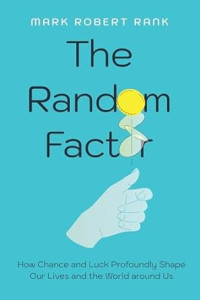Consider the random road that led to you reading this article. At some point, someone introduced you to Greater Good magazine. Perhaps you received an email or saw a post on someone’s social media feed, or maybe Google did the job. At that precise moment of time, you had a few minutes to spare and decided to click on it. That, of course, was in your control.

But before your click, someone—namely, me—had to write this article. An editor had to decide that I was a decent choice to write it. I had to accept—which I did mainly for one completely random reason: I had read the book in question and in fact had recently interviewed the author for my NPR podcast, Attribution.
Then, of course, there are the larger questions of how you, me, the editor, or the author even came into existence at all. Each one of our lives is the result of so many random acts, not the least of which is how our parents met each other or our grandparents, great-grandparents, and so on and so on.
If the role of random events is so significant in something as trivial as reading an article, imagine how they impact bigger events in our lives and the history of the world.
This is the point of Mark Robert Rank’s new book, The Random Factor: How Chance and Luck Profoundly Shape Our Lives and the World Around Us.
Rank is the Herbert S. Hadley Professor of Social Welfare at Washington University in St. Louis, whose previous research and writing focused on issues of poverty, inequality, and the American Dream.
While on one level the role of random events in our lives may seem intuitive or obvious, Rank’s book deftly makes the point that we under-appreciate randomness and do so to our own detriment.
The realms of randomness
If we look outside ourselves, we can see that randomness exists in the world around us. For example, Rank shares stories ranging from the ascendency of Adolf Hitler (if only he had gotten into art school) to the Cuban Missile Crisis (thank goodness a Soviet soldier was stuck outside of his submarine) to the unexpected cloud cover in Japan that saved the city of Kokura but devastated Nagasaki. Each of these major historical events were swayed by randomness in ways that irrevocably changed the fates of millions—if not the entire planet.
Speaking of the planet, Rank also looks even more broadly, as he considers randomness in the natural world. He writes:
Most striking is the very reason we are here. Some 66 million years ago, an asteroid hit the Earth at precisely the right angle and location to annihilate the dinosaurs, paving the path for our ascendency. Had there been as little as a 10-mile difference in its path of entry, we would not be here today and the dinosaurs would still be roaming the land.
Then there is the serendipity in scientific discovery. From penicillin to Velcro to sequencing DNA, each has randomness to thank for its very being.
There’s also luck in everyday events. Do you know which professional sports involve the most luck? Soccer and hockey, because the scores are so low. One goal makes a huge difference, and that one goal can be the result of a lucky bounce or random deflection. Or consider college admissions and prison sentencing, where the time of day when someone is “judging” you has been found to influence their receptivity to your cause.
Bringing the role of randomness closer to home, Rank also examines how it operates in our own personal lives. Consider the very basic facts that none of us choose who our parents are, when or where we are born, and our first and last names. All of these have been found to have a pretty significant impact on our lives.
Some may seem obvious, like the financial circumstances of your parents or the opportunities that your neighborhood provides. But some are less so. The month you’re born has an impact on how you’re treated in youth sports. Your first name impacts how often you get called on in class; your last name has an influence on college admissions. The year you were born impacts your job prospects, and so on and so on.
These random patterns also influence who comes in and out of your life. Consider the randomness of how you met your partner or your current group of friends.
As we also know, chance events often have life-or-death consequences, like who died and who escaped a war or a natural disaster. In our lives, we might recount our own amazing stories of accidents, chance, or random events that have either set us back or propelled us forward, shaping not only our lives but those of our families and friends.
Accepting the influence of luck
At this point, you might be blown away by the sheer number of ways randomness factors into our world and lives—or you still might be skeptical. After all, we all want to believe that our lives are largely within our control.
In my own research in conjunction with Public Agenda, when 2,000 Americans were asked about the factors that were most essential to achieving the American dream, they ranked luck 10th out of 11 factors. “A strong work ethic” was number one by a large margin.
Is randomness just another word for “luck”? Rank makes a distinction between the values we associate with the terms random, chance, or luck. As he told me in our interview:
Luck and chance are generally, as I use it in the book, applied to individuals, whereas randomness is more of a system-wide thing. We might say the world is filled with randomness, but that the people experience luck and chance. The difference between luck and chance is that chance is a fairly neutral term; luck implies something either good or bad. Americans tend to really discount the role of luck in terms of their lives. One of the reasons is, we are strongly steeped in the idea of rugged individualism and meritocracy.
People do it on their own, they succeed on their own, and they fail on their own. And the idea of luck and chance is not really in the picture. Now, on the other hand, if you do survey data, Europeans are much more likely to say, you know what, luck and chance actually are important in terms of economic outcomes.
Another cause for resisting the role of luck is our idea of a just world. We want to believe that good things happen to good people, and bad things happen to bad people, but that’s not always the case. As Rank says:
We like to think that the world is just, that what we get in life we deserve, either good or bad. The idea of randomness cuts against that. It doesn’t abide by this concept of justice. It doesn’t abide by the fact that, well, good luck or bad luck may even out. It may even out, it may not even out.
The benefits of recognizing randomness
All these effects of randomness are fascinating, and as I read Rank’s book, I found myself delighted by example after example. Each is another interesting tidbit one might look forward to dropping into their next dinner conversation.
But the value of appreciating the role of randomness extends well beyond the novelty of these stories. Importantly, Rank’s book also shares how thinking about randomness differently can improve our lives.
Appreciating randomness increases support for the unlucky. On a societal level, Rank told me, “Because we downplay the role of chance and luck, we also downplay the role of a social safety net. We say, you know what, you do it on your own, and that’s it, and go from there. I think that by accepting the idea of randomness and chance, it does have policy implications as well as personal implications.”
 The Random Factor: How Chance and Luck Profoundly Shape Our Lives and the World Around Us (University of California Press, 2024, 302 pages)
The Random Factor: How Chance and Luck Profoundly Shape Our Lives and the World Around Us (University of California Press, 2024, 302 pages)
When we truly appreciate how much luck shapes our lives, it allows us to want more support in place that we can access if we ever need it.
Seeing randomness in our lives makes us more empathic and humble. On a personal level, appreciating the role randomness plays in our life creates more empathy for others and more humility when it comes to our role in the world. It elicits a sense of wonder and awe at the randomness of life in a way that doesn’t have to take away from our own agency or diminish our own hard work. Rather, it should elevate feelings of empathy and inspire us to help others.
Seeing luck creates more luck. Some believe in the mantra that we “make our own luck.” Rank has a slightly different take. When we acknowledge the role of randomness, we become more attuned to it. This openness allows us to both accept that some things are beyond our control and take advantage of luck when we see it. He asks us to consider how we respond to chance events. What happens when an expected opportunity comes our way, or, conversely, how do we respond to adverse chance events?
Acknowledging luck increases our gratitude and appreciation for what we have. Some people wake up every day grateful to be alive. Or we see misfortune fall upon another and are thankful that it’s not us. The lack of control that comes with random acts can be frightening, knowing that the “bell may toll for us” next. But it can also expand our gratitude for what we have and the good fortune that comes with just being alive and healthy.
The recognition of randomness ensures that we do not take the good things in life for granted, and it allows us to understand the precarious nature of good fortune. Even for those currently less fortunate, it can be cause for appreciating the small things in life and hoping that the winds of chance may yet blow your way.
Randomness is the “spice of life.” Lastly, Rank asks us to imagine a life where everything is predetermined and predictable. “What a boring life that would be,” he writes. So many of life’s greatest moments happen without plans or expectations. Chance encounters and unpredictable events that we neither planned nor control spice things up and make life more enjoyable. It’s the excitement of not knowing how a game you’re watching may turn out, or the anticipation of never really knowing what tomorrow will bring.
One final random thought
Let’s imagine you found this random article of value—which I hope you did. Perhaps this changes your attitude the next time you see someone down on their luck, enough to help them. Maybe you give them some money or a connection that helps them get a job. Perhaps that job allows them to create something wonderful that helps the world.
Wouldn’t that be awesome? Such is the power of reflecting and recognizing the randomness all around us. It can inspire action, compassion, and a better life. For ourselves, for others, and for the world.







Comments